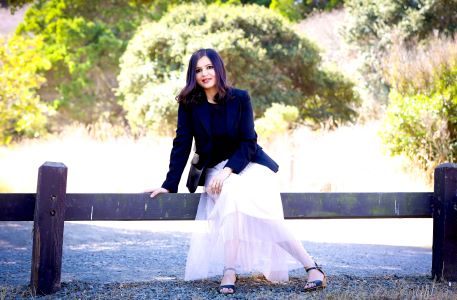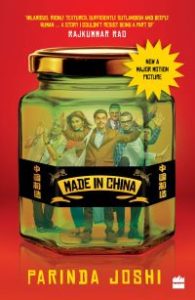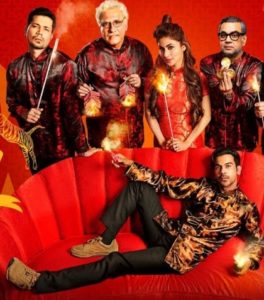Made In China wasn’t the easiest story to write: Parinda Joshi

Saurabh Tankha
Remember entrepreneur Raghuvir Mehta, played by Rajkumarr Rao in the movie Made In China. Forever failing at every business venture he sets up, Raghu’s life takes a turn on a trip to China and the story then moves on. Though the Mikhil Musale directed movie failed to generate interest among audiences, one must read the book on which the film is based to get the real feel of the darkly comical, soul-stirring and thrilling entrepreneurial journey of Raghu, penned by author Parinda Joshi.
Born to a businessman father and a banker mother who is also a naturopath, Joshi was raised in Ahmedabad. After marriage, she immigrated to Los Angeles where she navigated the challenges of starting life from scratch in an unfamiliar milieu, enriching herself with an MS in computer science, testing her limits and redefining herself. She now resides in Silicon Valley.
The US-based author feels it is hard to tell why the movie did not do well. “It could have a combination of many things — the positioning (it was a drama but the trailer may have led audiences to believe it was a comedy), the perception of the subject that may not have appealed to audiences during the festive season (since it was released during the Diwali weekend) or the technical flaws, which every film suffers from,” she says.
lifeandmore.in had an e-mail interaction with Joshi. Excerpts…
Made in China (Harper Collins; Rs 250; 312 pages) was originally written in the US, rewritten during trips to Croatia, Greece, and Spain before getting edited and published in India. How, amid traveling to all these countries and on these trips, does Raghu Mehta land up in China?
The genesis of the novel was the story about a god-fearing simple man going to China in search of a new business idea and getting caught up instead in the black market trade. It was fun but not the easiest story to write. Which is why I wrote and rewrote it over and over again.
How different are your earlier works — Live From London and Powerplay from Made In China?
They’re all very different books across different genres. Live from London is a coming of age story about a young Indian pop star. Powerplay delves into the murky corporate politics of a fictional IPL team based in Gujarat. Made In China is a dark comedy. The common thread is how my protagonists get embroiled in tough situations and rise above their circumstances. The humour is another common element, I guess.
When a movie is made on a book, how much of a compromise in terms of changes to the original storyline/ script does an author have to make?
I wouldn’t call it compromise. It’s taking the content from the source material and altering it to fit a different medium. Books are inherently different from movies. Books are wonderful because they allow the reader to be a part of the story; allow them to be the observers that have insight into the character’s thoughts and emotions, and all the nuances that create three-dimensional characters. There’s more detail, more focus on character development, and more depth. On the other hand, the great thing about movies is their ability to show, and the overall experience of watching one. Reading allows readers to create their own kaleidoscope and employ their imagination to make their own flights of fancy. Whereas movies are a look into the director’s interpretation of a writer’s creation; they immerse you into the story in a different way than a book including with music and visual effects. Both are potent in their own rights. Coming back to the question, it is generally known to authors via experiences of other authors and through contracts that production houses are at liberty to use as much or as little of the book’s material as they like.
Were you satisfied with the movie and did the characters do justice to what you had written in the original story? Or could things have been better?
That can be said of almost anything in retrospection. I think the entire team of writers was brilliant. The actors and the director were extraordinarily talented. The way Rajkummar Rao showcased Raghu, my protagonist’s angst, his dilemma, his insecurities, his failures and his triumphs were exceptional and beyond smooth. He’s an actor par excellence. Same for Boman Irani and Sumit Vyas. Those are the key characters in my book. And now I can’t possibly imagine anyone else doing those roles. It was an ensemble cast. Now when we (the other writers and I) introspect, there may been some structural issues. As they say, hindsight is always 20-20.
How successful have you been in keeping pace with Maya Angelou’s quote: “My mission in life is not merely to survive, but to thrive; and to do so with some passion, some compassion, some humour and some style?”
I thrive on creative stuff — photography, reading, writing. I think I could use some more compassion. I think we all could use some; the world would become such a wonderful place if we all had sufficient compassion. There’s thankfully a lot of humor in my life. I seek it out. I read fun books, watch comedies, go to a lot of stand-up shows and I hear it in my head too. My father is one of the funniest people I know. I work in the fashion industry and am exposed to a lot of luxury brands and fashion; although I think style is something that’s innate. Mine is bohemian, in apparel and mindset.
Your ideas germinate from…
Life around me. I generally carry a small diary around and I often jot down interesting observations. It makes for great dinner-time conversations. Sometimes I make Facebook posts out of it or read it to myself for amusement. If I stumble upon something striking, be it an idea or an observation or something that I feel could be turned into a full story, I put down a premise on paper. I mull over it for a while and if I can visualise the entire story along with the ending, I go for the kill. I then create a loose structure of sorts and fill out the sections as I go long. Also, I don’t always write in a linear fashion. Sometimes I hear conversations in my head between some characters and I develop those.
How different are you from other authors?
I’m not sure. I think a homogenous group of people are similar in many aspects but different in many others. I may share the same love for writing with other authors. Our technique, skills, and writing style will vary. Our goals may vary. Our perspectives will definitely vary. My writing is a combination of my imagination and an amalgamation of what I’m exposed to – ideas, stories, people, places, things, concepts and experiences. In that, I am unique.
What if your creative work doesn’t get good reviews?
It hurts. It’s your baby. Creative projects are very close to my heart. But I’ve learnt to separate constructive criticism from plain hatred. It really can teach you a lot and help you evolve if you can keep your mind open. I really do learn from all the critical feedback my work receives.
In your opinion, what is that one thing which is the most important part of a book?
A protagonist who’s interesting, three dimensional, has relatable aspects but sets out on an extraordinary journey, and can keep you hooked till the very end.
Is writing energising or exhausting?
Both. It’s like a relationship. The earlier bits are super exhilarating. Then it’s a bit of work. Things may get rocky. It hits that point when you’re exhausted. Then you find new ways to add spark and it goes back to being exciting.
The word “creative” to you is…
It’s the process of bringing someone new into being. I associate it with the onset life, with new ideas, music, laughter, romance, spring, something that makes my heart sing.
How much time do you write in a day?
There’s no such thing. I took six months off between my current and previous job when I wrote for hours at a stretch every single day. These days, I write mostly on weekends. Sometimes, when I’m in the right mood, I can write all night.
Do you believe in a writer’s block?
Absolutely. One can’t summon the muse when one’s ready to write and expect it to show up and do its magic. Crushing as it is, a writer must suffer through it.
What do you do when you are not writing?
I work full-time. I’m also a mother and a wife and a homemaker on weekends. I make it a point to hike every Saturday and Sunday at a state park nearby.
Any book that inspired you to take up writing?
Many. A lot of PG books that I read early on drew me to the world of writing. I was a huge man of his wit and humor. I think they had a strong impact on my writing style. A lot of books I read subsequently like books by Murakami, some essays I read by Woody Allen, Three Men in a Boat and especially, English August.
What does it take to be a good storyteller?
It’s a combination of vivid imagination, layered characters, an intriguing plot, creating a world that draws the reader in, details, depth, and treating the reader to surprising elements with the use of interesting phrases and metaphors. The last part is not essential. Simplicity works as well in certain cases.
Did any of your creative works get rejected by a publisher?
Of course. The publishing industry is somewhat saturated. It’s also a numbers game sometimes. Rejection in book publishing is a given. One just needs that one publishing house that’ll find value in what you’ve written.
Do book covers matter as much as the content?
They do. The book cover creates the first impression on its potential reader. It reaches out to them and communicates silently. It can either lure them or push them away.




